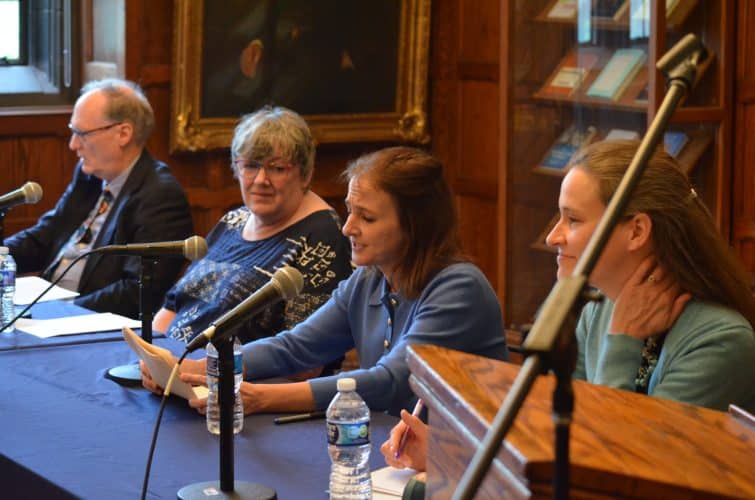Can we be good on our own, or do we need divine assistance? Four scholars explored this question in a symposium that was the highlight of LCI’s spring University Program Series. With Emily Austin (University of Chicago) moderating, Angela Knobel (University of Dallas), Candace Vogler (University of Chicago), and Daniel Lapsley (University of Notre Dame) reflected on the relationship between Aristotle’s and Aquinas’ moral frameworks from theological, philosophical, practical, and behavioral-scientific perspectives.
The author of a recent book on the subject, Angela Knobel set the stage by remarking on the relationship between Aristotelian natural virtue and Aquinas’ notion of infused virtue. Contrary to typical views, Knobel argued that the apparent dichotomy between the Aristotelian conception of virtue and the Thomistic one is neither as extreme nor as loose as is sometimes supposed. She remarked that Aquinas is both “more Christian and more Aristotelian” than often presumed. Aristotelian excellence consists in becoming the best possible version of oneself through the self-cultivation of virtue, whereas Christian moral excellence has as its goal union with God as His sons and daughters – something we cannot do on our own. While Aquinas embraces Aristotle’s view of nature and moral excellence, he joins it to the Christian notion that nature is both transformed and perfected by grace. For Aquinas, the moral excellence radically depends on God and the work of the Holy Spirit. Aquinas’s notion of infused virtue means that grace radically transforms human fulfillment. For Knobel, Aquinas gives us a thoroughly Aristotelian picture of the fulfillment of nature, “and yet, in its recognition of our utter dependence on God, it is not Aristotelian at all.”
Candace Vogler pressed further into the inadequacies of the Aristotelian moral framework as a suitable foundation for contemporary moral thought. “No, we can’t be good on our own,” she concluded. Vogler noted that we should not take the Aristotelian account because it excludes all but well-to-do and able-bodied men in the scope of beings capable and worthy of the moral life. Pressing on in a jovial and satirical manner, she further pointed out the quietness of such a man’s conscience – “it is very hard to imagine Aristotle’s phronimos ever needing to go to confession!”
As the psychologist on the panel, Daniel Lapsley noted points of resonance between Aquinas’ account of moral and infused virtue and the behavioral science theories of the social cognitive development of moral identity. Empirical research has revealed that young children have an inborn moral sense akin to synderesis, the Thomistic concept of conscience. However, on the issue of divine aid, he emphasized that empirical research is inherently limited, presenting challenges to any future project of “Thomistic virtue psychology.” Psychology cannot access the supernatural, and even if it could, there is much evidence that moral goals and identity can be accounted for without an appeal to supernatural origins. As Aristotle asserted, we have access to moral exemplars. One case for the need for divine aid, on Lapsley’s account, is the darker side of social formation. Human agency is saturated with contingency; our motivations as well as those of others are not always transparent, and therefore precarious. In such a world, getting it right might just require God’s help.
